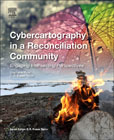
Cybercartography in a Reconciliation Community: Engaging Intersecting Perspectives
Pyne, Stephanie
Taylor, D. R. Fraser
Cybercartography in a Reconciliation Community: Engaging Intersecting Perspectives, Volume Eight, gathers perspectives on issues related to reconciliation-primarily in a residential school context-and the unifying power of cybercartography in identifying intersections in disparate perspectives, understanding approaches toward reconciliation and education, and enacting reflexivity in research and knowledge dissemination. The positionality aspect of reflexivity is reflected in the chapter contributions concerning various aspects of cybercartographic atlas design and development research. The book offers theoretical and practical knowledge of collaborative transdisciplinary research through its reflexive assessment of the relationships, processes and knowledge involved in cybercartographic research. Using, most specifically, the Residential Schools Land Memory Mapping Project for context, the book describes the project's innovative collaborative approach to mapping institutional material and volunteered geographic information. Exploring cybercartography through the lens of this atlas project provides for a comprehensive understanding of both cybercartography and transdisciplinary research, while informing the reader of education and reconciliation initiatives in Canada, the U.S., the U.K. and Italy. Includes worldwide examples of reconciliation work, especially related to residential schools, and examines common themes in the issues discussedOffers both conceptual and applied dimensions, and provides a good example of a reflexive approach to both research and knowledge disseminationAddresses a modern application for cybercartography that is of considerable societal importanceProvides historiographical accounts of atlas-making processes, multidisciplinary perspectives on research issues and conceptual clarifications INDICE: 1. Introduction, Approach and Overview2. Iterative Evolution in Cybercartography: The Residential Schools Land Memory Mapping Project3. Shingwauk Residential School Centre: Past, Present and Future4. The Carlisle Indian School Project5. Comparison between Canadian and American Residential Schools6. Curating Residential Schools Material from an Indigenous Artist's Perspective7. Workhouses and Foundling Homes in the UK: Moving from Models for Residential Schools toward Models for Residential Schools Reconciliation8. Residential Schools, Reconciliation and Archaeology: Opportunities and Challenges for Mapping9. Re-uniting, Remembering and Sharing with the Next Generation: Site-based Story Telling and Mapping the Assiniboia Indian Residential School Reunion10. Community, Archives and Cybercartography: Designing a Geospatial Archival Portal11. Cybercartography and Education: Educational Outreach and Participatory Mapping12. Ethical Issues and Inclusivity in Cybercartography: Geospatial Archival Portal Research13. Cybercartography and Networks: Emerging Directions for the Residential Schools Land Memory Mapping Project14. Conclusion
- ISBN: 978-0-12-815343-7
- Editorial: Elsevier
- Encuadernacion: Rústica
- Páginas: 270
- Fecha Publicación: 01/08/2019
- Nº Volúmenes: 1
- Idioma: Inglés
